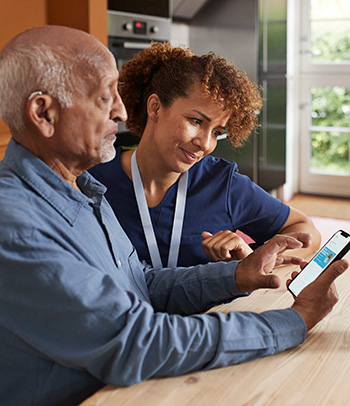More and more aspects of our lives revolve around technology. We can order groceries from a phone and have them delivered to our house. We can read a book on a tablet, never turning an actual page by hand. We can video chat with our loved ones from hundreds of miles away.
Our health care is no different. Often, we are expected to check in to our appointments online or use technology to refill prescriptions. We are asked to use a video call to explain a new symptom to our health care provider.
If you want to incorporate virtual tools into your health care experience but haven’t felt like you have the resources or knowledge to make it happen, let VA help you get started.
Using this technology comes with many benefits. We can make timely connections with our providers when we need it most. We can save time and money on transportation to and from appointments by using video chats.
But technology can also be challenging. What if you don’t have access to the internet in your home? What if you don’t feel comfortable using technology? What if you don’t have the money to buy a computer, tablet or smart phone?
The Department of Veterans Affairs (VA) wants to ensure that all of its patients can access high-quality health care through the use of virtual tools such as telemedicine, smartphone apps and patient portals, and help to eliminate the barriers that may stand in their way.
Check out the important benefits of technology in health care and what resources are available to ensure you can take advantage of the virtual tools designed to help you.
Why Is Technology Important to My Health Care?
Health care systems are turning to technology to provide patients with improved access to their health care information and to provide better communication with their providers. Here are some ways technology can improve your overall health care experience:
 You can make appointments with providers and specialists through video calls and live chats, not having to worry about transportation or taking time off from work.
You can make appointments with providers and specialists through video calls and live chats, not having to worry about transportation or taking time off from work.- You can message your providers through a secure portal to discuss questions, test results and more without having to wait for an appointment.
- You can manage your prescriptions, claims information, immunization records and more from a secure portal, giving you more control over your health care.
- You can find additional support for various health care concerns through apps on your phone or tablet such as weight management apps, insomnia coaches, post-traumatic stress disorder (PTSD), guidance and more.
- You can connect with specialists who don’t live in your area.
- You can receive remote monitoring in your home for chronic diseases through programs such as VA’s Care Coordination Telehealth Program.
But to do all of this, you need the internet, internet-enabled devices and the confidence to use the technology.
Do Veterans Have Access to the Technology They Need?
According to research from the National Library of Medicine, many older people and Veterans have less access to technology than other population groups. Their research found that many Veterans reported having no internet access in their home or the money to purchase the right equipment to use it. In addition, some older Veterans felt they didn’t have the skills needed to use the internet for their health care or didn’t see the benefit of doing so.
What Is VA Doing to Make It Easier?
The Federal Communications Commission found that 16% of Veteran households do not have a way to connect to the internet at home. So, what is VA doing to address this issue?
VA offers a wide range of helpful resources, including the Digital Divide Consult for Veterans who lack internet access or who cannot afford new technology. The Digital Divide Consult offers the following assistance:
- VA internet-connected devices – If you don’t have a device with internet access, VA can lend you a tablet at no cost. The Digital Divide Consult can help determine if you’re eligible.
- Internet and phone service discounts – The Federal Communications Commission’s (FCC) Lifeline program subsidizes the cost of home broadband and phone service. Many Veterans are eligible, including Veterans with lower incomes and Veterans who participate in certain federal programs such as Medicaid, Supplemental Security Income, VA pension and more. The FCC also offers the Affordable Connectivity Program, which provides eligible households with a discount on broadband service and connected devices. The Digital Divide Consult can help you determine if you’re eligible for either of these programs and show you how to apply.
- Telehealth sites in your community – VA is bringing telehealth care into communities through ATLAS sites (Accessing Telehealth through Local Area Stations). These sites are comfortable, private spaces for Veterans to have video appointments with their providers in areas where this might not have been possible before. VA has teamed up with organizations such as the American Legion, Veterans of Foreign Wars, Walmart and more to create these sites in different communities. See if you have an ATLAS site near you.
- Free mobile connectivity for telehealth – AT&T, Safelink by TracFone, T-Mobile and Verizon can help Veterans avoid data charges when using VA Video Connect on their networks. This lets Veterans access their VA health care team without having to worry about additional data fees.
- Additional assistance – When a provider identifies a Veteran who needs assistance with technology, they can refer them to VA social workers who have been trained to help Veterans overcome digital roadblocks. This might include helping them connect with the services listed above and can also include ensuring Veterans understand how to set up a video call, use their device to refill a prescription or direct message their provider from their online portal. In addition, many VA sites have Virtual Health Resource Centers that can help you with hands-on support, training, troubleshooting and more. Experts can help you gain digital confidence, get your new device up and running, and figure out what virtual tools are right for you.
If you want to incorporate virtual tools into your health care experience but haven’t felt like you have the resources or knowledge to make it happen, let VA help you get started.







